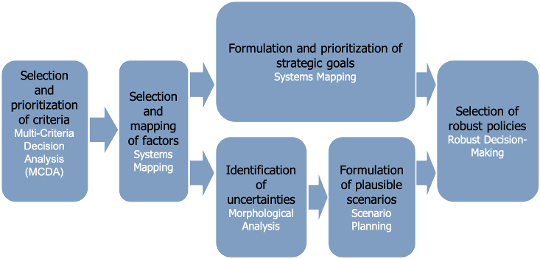Qualitative systems analysis tools to inform strategic planning for policymaking
Many policy planning processes are characterized by:

Data scarcity, incompleteness and ambiguity

“Deep uncertainty”

Requirements of policy feasibility for and ownership by stakeholders

Urgency in providing solutions
To address these challenges, IIASA tailored a suite of systems analysis methods each tackling a specific planning step (or, sometimes, multiple steps simultaneously).
These methods belong to qualitative (or sometimes called ‘soft’) systems analysis methods which are mainly based on work with stakeholders and experts. These methods provide the following benefits:

Structure the problem and assist in sense-making

Find consensus among stakeholders

Provide social
learning
These methods were applied in the following projects:
Strategy of sustainable industrial development of Kyrgyzstan
Growing globalization increases the interconnectedness of countries embedded in complex supply and value chains. Countries also become increasingly interdependent through transnational transport corridors, the exchange of information and knowledge investments and migrant flows, etc. The future of the Kyrgyz Republic - a small, landlocked and open developing economy - is heavily influenced by global and regional geopolitical and geoeconomic processes. More
Water Nexus Policy Strategic Planning
Water is a truly cross-sectorial resource that has an impact on population well-being, economic growth, and the environment. Developing resilient (“no-regret”) water strategies given conflicting interests and great uncertainty is of the highest importance for the sustainable development of any country. Feasible policies should reconcile conflicting interests of different sectors and different stakeholders and should take a proper account of immense uncertainty about the future availability of water resources and key factors, which impact it. More
Images by Mike_kiev & Denisismagilov via Dreamstime.



PUBLICATIONS






